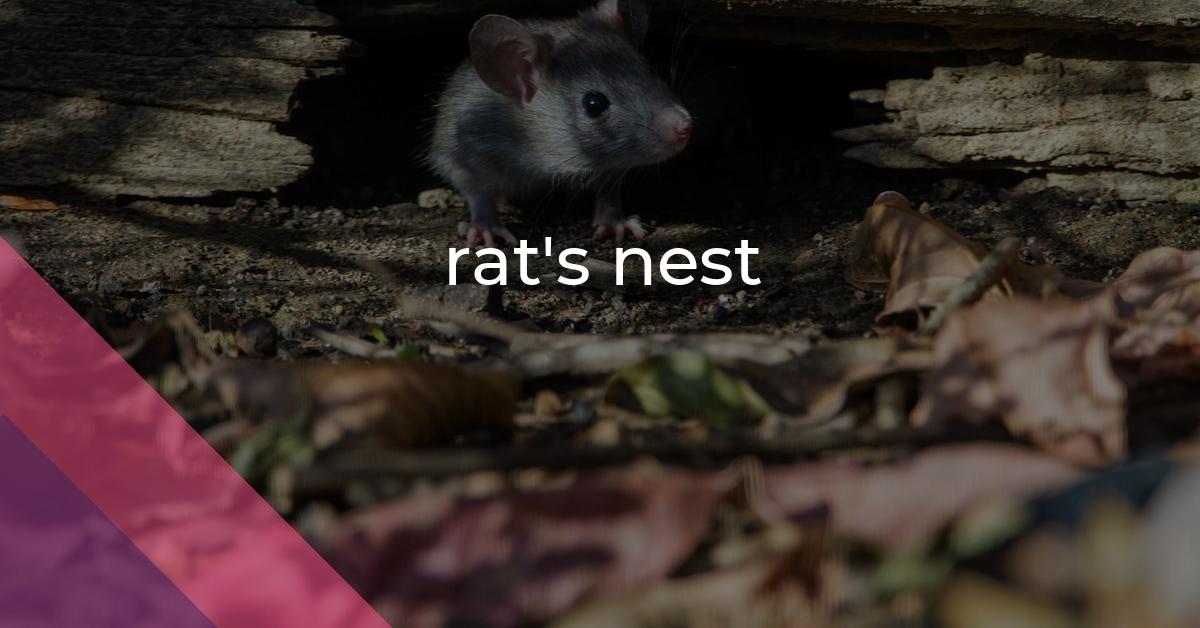rat’s nest: Idiom Meaning and Origin
What does ‘rat's nest’ mean?
The idiom rat's nest refers to a disorganized or messy situation that is difficult to resolve or clean up.

Idiom Explorer
The idiom *rough patch* refers to a difficult or challenging period of time in someone's life or a situation. It implies that things are not going well and there are obstacles or problems to overcome.
The idiom "rat run" refers to a shortcut or alternative route used to avoid traffic or congestion, often through narrow or obscure roads. It implies that the route is less commonly known and may not be the most direct or official path. People use rat runs to save time or to escape heavy traffic, particularly during rush hours.
The idiom "rack and ruin" means to be in a state of complete destruction or collapse.
The idiom "put the cat among the pigeons" means to do or say something that causes confusion, trouble, or controversy, resulting in a chaotic or unsettled situation.
The idiom "Pandora's box" refers to a situation or action that may seem harmless at first but ultimately causes a lot of unforeseen trouble or complications.
The idiom "ox is in the ditch" means to be in a difficult or problematic situation that requires immediate attention or assistance.
An idiom meaning to be in a difficult or challenging situation that needs to be resolved or fixed. It implies being in a state of trouble or inconvenience.
The idiom "open Pandora's box" means to start or create a problem or a series of problems that are difficult or impossible to solve.
The idiom "on the ropes" means being in a difficult or vulnerable position, usually in a competition or struggle.
"Mysterious Tangle"
The idiom "rat's nest" is a common phrase in the English language, known for its metaphorical usage. It holds a negative connotation and is often used to describe a messy, chaotic, or disorganized situation or place. The etymology of this idiom can be traced back to its literal meaning, referring to the tangled, intricate nests constructed by rats.
The idiom "rat's nest" is believed to have originated from the habits of rats, particularly their nesting behavior. Rats create nests using whatever materials they can find, resulting in a tangled mess of objects and debris. This literal representation of a rat's nest serves as the basis for the figurative meaning of the idiom.
When the idiom is applied to a situation or place, it implies that it is in a state of disarray or confusion. This can refer to physical spaces, such as a cluttered room or a messy work area, or it can be used metaphorically to describe a complicated problem or a complex and convoluted set of circumstances. The use of the idiom "rat's nest" presents a vivid image of disorder and chaos, emphasizing the undesirable nature of the situation being described.
One related idiom is "hurrah's nest". This idiom is used to describe a messy or disorganized situation that is also filled with celebration or excitement. It combines the chaotic nature of a rat's nest with the joyful chaos of a hurrah, emphasizing the feeling of disorder amidst happiness or celebration.
Another related idiom is "Mexican breakfast". This idiom refers to a situation or state of affairs that is chaotic, confusing, or disorganized. It is similar to a rat's nest in that it portrays disorder, but the addition of "Mexican breakfast" adds a cultural element and a touch of humor to the idiom.
A third related idiom is "dog's breakfast". This idiom is used to describe a situation or thing that is messy, disorganized, or poorly done. It conveys a sense of haphazardness, similar to a rat's nest, but with the added notion that it is unappealing or unsatisfactory.
"can of worms" is another idiom related to a rat's nest. It is used to describe a situation or issue that, once opened or addressed, becomes complicated, difficult, or contentious. Just like a rat's nest, opening a can of worms can reveal a complex and tangled mess that is challenging to resolve.
The final related idiom is "cat's cradle". This idiom refers to a complicated or entangled situation, often involving multiple people or factors. Similar to a rat's nest, a cat's cradle represents a complex web of interconnected elements that can be difficult to unravel or make sense of.
It is worth noting that the usage of these idioms varies depending on the context and personal interpretation. The flexibility of the English language allows for creative and individualized usage of idiomatic expressions, contributing to the richness and vibrancy of everyday conversations.
Example usage
Examples of how the idiom "rat's nest" can be used in a sentence:
- His hair was such a rat's nest, it took him a long time to comb it out.
- When I opened the back of my computer, I was shocked to find a rat's nest of tangled wires.
- She tried to tidy up her desk, but it was still a rat's nest of papers and clutter.
More "Metaphorical" idioms



